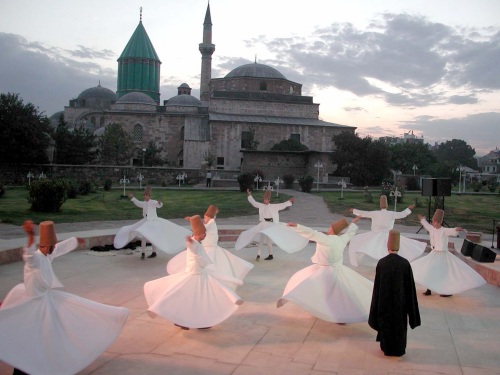
(Wikimedia Commons)
Some have written to me, wondering (in connection with the horrific recent massacre at that Egyptian mosque in the Sinai) why Islamist terrorists would murder devout Muslims — and especially when the victims were actually gathered in a mosque for the major weekly Muslim worship service, the Friday noon prayer. (In Arabic, Friday is called yawm al-jum‘a — or, in the dialect of Cairo and northern Egypt, yawm al-gum‘a — “the day of meeting.”)
Unfortunately, the hatred of some Muslim extremists for adherents of Sufism, or Islamic mysticism, is not at all surprising to most of us who have studied the religion. Salafi Muslims (e.g., in Saudi Arabia, the so-called Wahhabis) — who are committed to an extremely rigorous, intolerant, and legalistic form of Islam — have long disliked Sufism. They regard it as un-Islamic and heretical. They dislike its common veneration of saints, which they see as idolatrous.
I think these two recently published newspaper articles might help readers to understand just a bit of the background:
Washington Post: “Why Muslim extremists attacked this mosque in Egypt”
New York Times: “Who Are Sufi Muslims and Why Do Some Extremists Hate Them?”
There are, though, one or two errors in these articles. For example, I suspect that, when the New York Times author wrote of Sufis that they “try to get closer to God by seeking spiritual learning known as tariqa,” what she meant, instead of tariqa (which refers to a Sufi mystical order or brotherhood), was actually ma‘rifa (a form of mystical “knowing” — “knowledge” is what the word literally means — that is sometimes rendered in English as gnosis).
***
Not a few in the West — including myself — find much to admire in many forms and historical figures of Sufism. Here is a tiny selection of quotations attributed to two great early Sufis, the woman Rabi‘a al-‘Adawiyya or Rabi‘a of Basra (ca. AD 715 to 801) and Hasan al-Basri (AD 642 to 728), whose alleged marriage proposal to Rabi‘a was turned down on the grounds that her love for God left nothing over with which to love him. (They would have been one of the great “power couples” in the history of religion and spirituality, of course, but — look at the discrepancy in their ages — such a proposal of marriage is, I think, quite unlikely to have been made.)
Admonish the people with your actions and not with your statements.
If you sell this life for the next, you will win both of them. If you sell the next life for this world then you will lose both of them.
O God! if I worship Thee in fear of Hell, burn me in Hell; and if I worship Thee in hope of Paradise, exclude me from Paradise; but if I worship Thee for Thine own sake, withhold not thine everlasting beauty.
Know that you cannot love God until you love obeying Him.
O my Lord, whatever share of this world You have bestowed on me, bestow it to my enemies, and whatever share of the next world You have for me, give it to my friends. You are enough for me.
You chase this world, when it was meant as a punishment for Adam.
You are nothing but a number of days, and, whenever a day passes away, a part of you passes away.
I seek forgiveness from God for my lack of sincerity when I say I seek the forgiveness of God.
Seek knowledge in a way that does not harm your worship, and worship in a way that does not harm your knowledge. Whoever acts without knowledge harms more than he benefits.
I will not serve Allah like a laborer, in expectation of my wages.
O Son of Adam! Walk on the earth with your feet as long as you wish, for it will soon be your grave. You have not ceased to subtract from your lifespan since you came from your mother’s womb.
Posted from Park City, Utah












